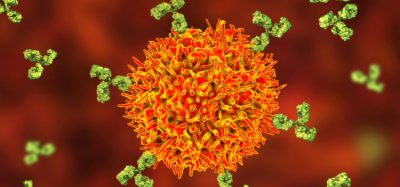Fostamatinib reduces COVID-19 risks by 50 percent in Phase II study
Posted: 2 September 2021 | Anna Begley (European Pharmaceutical Review) | No comments yet
Fostamatinib significantly reduced serious adverse effects and risk of death in hospitalised COVID-19 patients, shows Phase II study.


Rigel Pharmaceuticals have announced the publication of results from a Phase II clinical trial evaluating the safety of fostamatinib for the treatment of hospitalised patients with COVID-19.
Rigel’s Tavalisse® (fostamatinib disodium hexahydrate) is the only oral spleen tyrosine kinase (SYK) inhibitor for the treatment of adult patients with chronic immune thrombocytopenia who have had an insufficient response to a previous treatment. The Phase II double-blind, placebo-controlled clinical trial sponsored by the National Heart, Lung, and Blood Institute (NHLBI), part of the National Institutes of Health (NIH), in collaboration with Inova Health System, studied the effect of fostamatinib for the treatment of COVID-19.
The trial enrolled 59 hospitalised patients with COVID-19 who were a five to seven on the eight-point ordinal scale. Patients were randomly assigned to one of two cohorts: fostamatinib plus standard of care (SOC) and matched placebo plus SOC (1:1). Treatment was administered orally twice daily for 14 days, with a follow-up period through day 60. The primary outcome was the cumulative incidence of serious adverse events (SAEs) by Day 29.
The results from the trial demonstrated that the addition of fostamatinib to SOC, which included the antiviral remdesivir and the steroid dexamethasone, was well tolerated and associated with clinically meaningful improvement in clinical outcomes in hospitalised COVID-19 patients who required supplemental oxygen.
While the study was not powered to test clinical efficacy, numerous prespecified secondary endpoints consistently favoured fostamatinib, including mortality, time to sustained recovery, change in ordinal scale assessment, number of days on oxygen and number of days in the intensive care unit (ICU), suggesting that fostamatinib may provide an additional therapeutic benefit compared to current SOC alone.
Key findings within the fostamatinib Phase II trial include:
- The study met the primary endpoint showing fostamatinib did not increase the incidence of SAEs compared with placebo.
- The overall incidence of SAEs by Day 29 was approximately 50 percent less in the fostamatinib group (10.5 percent) compared with the placebo group (22.0 percent) . The most frequent SAE reported by Day 29 was hypoxia, occurring in one patient receiving fostamatinib and three patients receiving placebo.
- At Day 29, in the overall population there were zero deaths in the fostamatinib group compared to three in the placebo group.
- The median number of days in the ICU was reduced by four days, from seven days in the placebo group to three days in the fostamatinib group.
- The median number of days on oxygen was eight in the fostamatinib group compared to 20 in the placebo group. The difference was even greater in more severe patients, with the fostamatinib group at 10 days compared to placebo at 28 days.
- Fostamatinib was superior to placebo in accelerating improvement in clinical status from baseline by Day 15 using ordinal scale assessments.
- The median time to recovery was eight days in both groups.
- Despite general SOC use of both steroids and remdesivir in all 59 patients, there was a consistently greater reduction in NETosis and other inflammatory biomarkers in the fostamatinib group compared to the placebo group.
“With the need remaining so great, we are very pleased with the growing body of evidence that suggests fostamatinib may provide clinical benefit for those patients hospitalised with COVID-19,” commented Raul Rodriguez, president and Chief Executive Officer of Rigel. “Our larger Phase III clinical trial in COVID-19, which we expect to complete later this year, will provide us with further understanding of the safety and efficacy of fostamatinib and its potential as a new therapy for these patients.”
The study was published in Clinical Infections.
Related topics
Big Pharma, Clinical Development, Clinical Trials, Drug Development, Drug Safety, Research & Development (R&D), Therapeutics, Viruses
Related organisations
Inova Health System, National Heart Lung and Blood Institute (NHLBI), National Institutes of Health (NIH), Rigel









